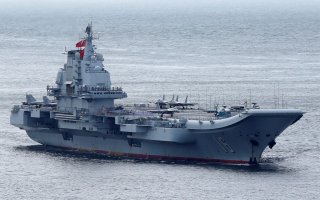China Wants to Dominate the South China Sea—and This Is How
Note: it might involve breaking international law.
U.S. and allied mariners and airmen, accordingly, must study China’s martial traditions, gleaning insight into how offshore active defense might unfold in the South China Sea. If you’re Beijing and have built up a seagoing militia, an impressive coast guard, Asia’s biggest indigenous navy, and a sizable arsenal of land-based weaponry to influence events at sea, how do you alloy those components into a sharp combat implement—and consolidate control over a semi-enclosed sea?
Essaying some foresight into these matters now could pay off handsomely if China tries to put General Chang’s—and Mao’s—strategic concept into practice.
Speaking of whom, a final bit of advice from Mao Zedong. Chang deployed China’s traditional lexicon, centered on people’s war, to describe how Beijing may transact business in Southeast Asia. But bear in mind that a strategy of the weak was expedient for Mao, not his strategic preference. He was writing for a China that was flat on its back, wracked by civil war and foreign invasion.
It could do little else. But the goal of active defense—of people’s war—was to make the Red Army the stronger antagonist. Once Maoist forces reversed the force imbalance, they meant to unleash a counteroffensive and win on the conventional battleground.
This is not Mao’s China. It’s already a brawny economic and military power, and would be fighting on its own ground. Today’s PLA enjoys far more offensive options than did Mao’s Red Army. Rather than revert to pure people’s war on the Maoist pattern, PLA commanders could pursue a mix of small- and big-unit engagements against the U.S.-led coalition.
People’s war, then, could start to look awfully like conventional marine combat if Beijing believes the military balance and the trendlines favor China.
By all means, let’s review China’s way of war, discerning what we can about Chinese warmaking habits and reflexes. But these are not automatons replaying the Maoist script from the 1930s and 1940s. How they might transpose Maoist doctrine to the offshore arena—and how an unruly coalition can surmount such a challenge—is the question before friends of maritime freedom.
James Holmes is J. C. Wylie Chair of Maritime Strategy at the Naval War College and author of “Visualize Chinese Sea Power,” in the current issue of the Naval Institute Proceedings. The views voiced here are his alone. This piece first appeared in 2016. Image: Reuters.

